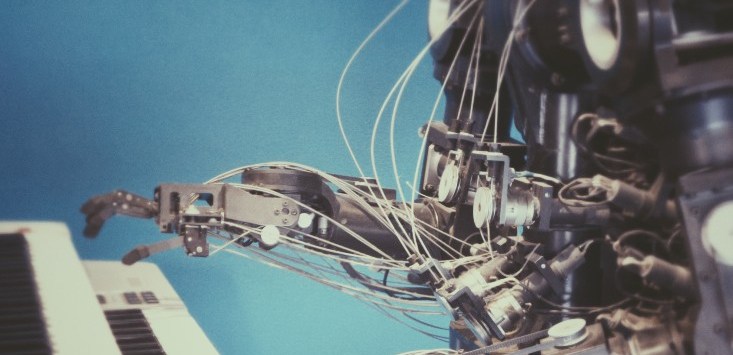
Source: Unsplash/Possessed Photography
Can AI make better investment decisions than humans? Maybe, but the answer is a bit more complicated than that.
AI is already widely used in investment markets, and we’ve now seen all forms of ‘algorithmic trading’ used by large-scale hedge funds and specialist fund managers. In fact, there are estimates that algorithmic trading accounts for more than 60% of trading in US equity markets alone. The Australian market, being smaller and less liquid, most likely accounts for a lower percentage of algorithmic trading activity, but it is still significant, nevertheless.
Despite this trend, there’s still a lot of ‘grey area’ when it comes to whether it ‘outperforms’ human decision making.
Fast, bias-free decision making
The primary benefit of relying on AI for investment or decision-making is that the trade is executed, literally, within a nanosecond of the price-sensitive information being released. This is something that a human simply cannot do. Apart from the reaction time, humans have toilet breaks, long lunches and sick days. The algorithm, on the other hand, does not.
There are other advantages that an algorithm, or an investing robot or “bot”, has over humans. A robot governed by an algorithm shows no emotional bias. Most humans, when making trading and investment decisions, are driven by emotions like fear, greed, and prejudice In fact, a recent survey found that 66% of investors have regretted an impulsive or emotionally charged investing decision. Alarmingly, 32% admit trading while intoxicated.
Some of these biases we see that humans have, which aren’t prevalent in ‘robots’ include:
- Confirmation bias: an investor’s inclination to selectively seek out information that supports their existing views and ignore or dispute information that does not support their existing views;
- Anchoring: this is the natural tendency of investors to attach their views to irrelevant, outdated, or incomplete information in making investment decisions;
- Herd mentality: people are predisposed to a herd mentality. When it comes to investments, that means they often base decisions on the consensus of a larger group, rather than on what makes the most logical sense. As the world’s smartest investors know, it is not the crowd that makes money, it’s the individuals that do; and
- Loss aversion: psychologists tell us that there is a natural tendency among investors to prefer avoiding a loss, to realising a gain. An algorithm knows that, logically, the financial outcome is identical.
However, humans tend to avoid incurring a loss, even though there are times when this defies logic. A common example is investors reviewing their investment portfolio who refuse to sell their ‘losers’, but insist on keeping their ‘winners’. There is no logic that supports a decision on this basis.
Investment vs trading decisions
Does algorithmic trading have relevance to investment decisions, as opposed to trading decisions? Evidence suggests that many of the features and benefits of AI inherent in algorithmic, high-frequency trading are relevant to investment decision-making.
Some key benefits of ‘robots’ being used in investment decisions include the elimination of emotional conflicts, speed of execution, and the ability to analyse and assimilate vast amounts of investment-related data quickly and objectively. These data points can include macro-economic statistics like inflation, interest rates, employment numbers, commodity price movements, currency and lead indicators of GDP like consumer confidence surveys and job advertisements. All of these factors impact share price movements in the short-term, as well as the medium- and long-term.
That being said, investment decisions have a longer time horizon and may have different objectives when taking certain factors into account, such as taxation treatment, liquidity needs, capital security and regulatory matters. In other words, investment decisions are typically based on qualitative factors while trading decisions rely more on quantitative analysis.
So, the answer to AI being ‘better at humans’ when it comes to investing in the long term, is not as clear cut as share trading, where AI is already firmly entrenched.
Putting the augmented in AI
Perhaps if not artificial intelligence, then augmented intelligence, is the future role of algorithms in investment decision-making.
In this way, a degree of collaboration between artificial intelligence and human intelligence, without replacing human intelligence, may very well be the way of the future when it comes to scaling effective investment decision-making. As the saying goes, “money never sleeps”.
Handpicked for you

ANZ celebrates launch of its digital ‘stablecoin’, putting the bank’s reputation behind a cryptocurrency revolution



COMMENTS
SmartCompany is committed to hosting lively discussions. Help us keep the conversation useful, interesting and welcoming. We aim to publish comments quickly in the interest of promoting robust conversation, but we’re a small team and we deploy filters to protect against legal risk. Occasionally your comment may be held up while it is being reviewed, but we’re working as fast as we can to keep the conversation rolling.
The SmartCompany comment section is members-only content. Please subscribe to leave a comment.
The SmartCompany comment section is members-only content. Please login to leave a comment.